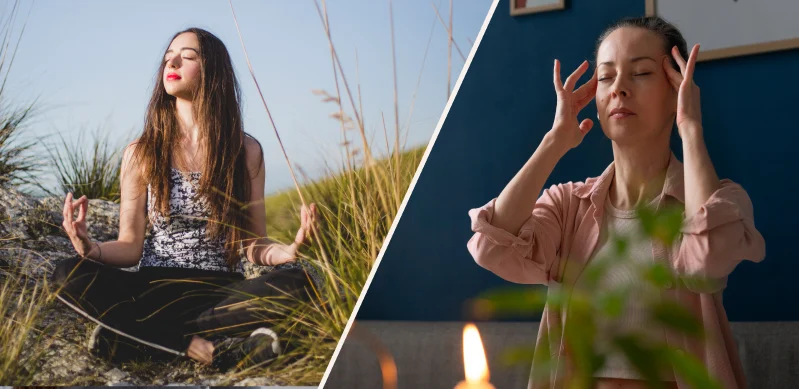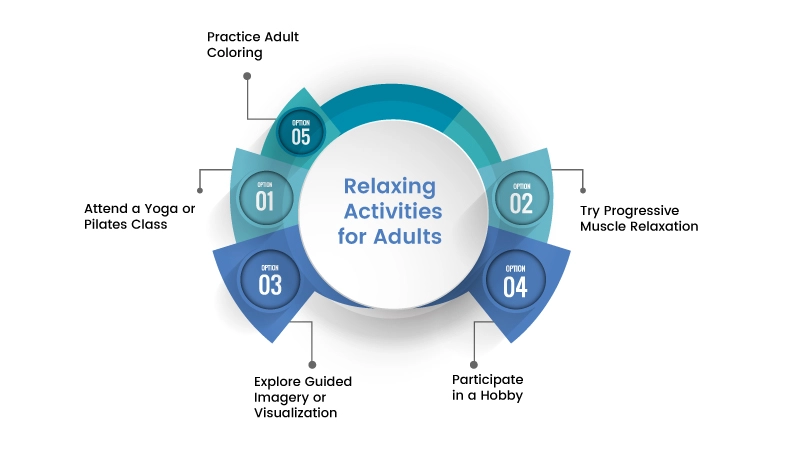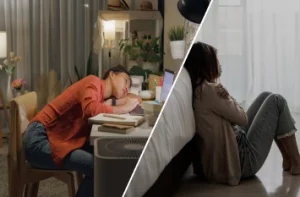
How Can SPRAVATO® Help Me?
How Can SPRAVATO® Help Me? If you’re battling treatment-resistant depression (TRD) or major depressive disorder (MDD) with suicidal thoughts, finding effective relief can feel overwhelming.

Understanding how to relax your mind is essential for maintaining overall well-being. The constant barrage of information, daily stresses, and endless to-do lists can leave your mind feeling overwhelmed and exhausted. Relaxing your mind isn’t just about finding peace in the moment; it’s about fostering a sustainable mental state that promotes clarity, focus, and emotional balance.
Recognizing when you need to relax is crucial—signs include feeling persistently anxious, having trouble concentrating, experiencing mood swings, or suffering from insomnia.
Taking the time to calm your mind can lead to improved mental health, better decision-making, and a more positive outlook on life. Ready to find your inner peace? Let’s explore some effective ways to relax your mind.
Feeling overwhelmed can manifest in various physical and emotional symptoms, making it crucial to recognize when you need to calm down. Here are some signs that indicate it’s time to give your mind a break:
If you find yourself saying, “I don’t know how to relax,” you’re not alone. Many people struggle to unwind amidst the hustle and bustle of daily life. The good news is that relaxation is a skill that can be learned and cultivated over time.
It’s essential to understand that relaxation looks different for everyone, and what works for one person may not work for another. The key is to experiment with various relaxation techniques until you find what resonates with you.
Whether it’s meditation, deep breathing exercises, spending time in nature, or engaging in creative activities, there are countless ways to relax your mind and body. Remember, relaxation is not a one-size-fits-all solution, so be patient with yourself as you explore different strategies and find what brings you peace and serenity.
Looking for some relaxation inspiration? Here are ten soothing activities to help you unwind and rejuvenate your mind and body:
Practice Mindfulness Meditation: Set aside a few minutes each day to sit quietly, focus on your breath, and bring your attention to the present moment. Mindfulness meditation can help calm racing thoughts and promote inner peace.
Take a Nature Walk: Spend time outdoors surrounded by the beauty of nature. Whether it’s a leisurely stroll through the park or a hike in the mountains, connecting with nature can help reduce stress and increase feelings of well-being.
Indulge in a Warm Bath: Treat yourself to a luxurious soak in the tub with your favorite bath salts or essential oils. The warm water can soothe tense muscles and help you relax both physically and mentally.
Practice Yoga: Roll out your mat and engage in a gentle yoga practice to stretch, strengthen, and relax your body. Yoga combines movement with breath awareness, promoting relaxation and stress relief.
Listen to Calming Music: Create a playlist of soothing music or nature sounds to help calm your mind and create a peaceful atmosphere. Close your eyes, focus on the music, and let yourself drift away into relaxation.
Engage in Creative Expression: Channel your emotions and energy into creative activities like painting, drawing, writing, or crafting. Creative expression can be a therapeutic outlet for stress and a way to tap into your inner creativity.
Enjoy a Cup of Herbal Tea: Sip on a warm cup of herbal tea, such as chamomile, lavender, or peppermint, known for their calming properties. Taking a moment to pause and savor a soothing beverage can help you relax and unwind.
Practice Deep Breathing Exercises: Incorporate deep breathing techniques into your daily routine to activate the body’s relaxation response. Take slow, deep breaths, focusing on the sensation of the breath moving in and out of your body.
Read a Book or Listen to an Audiobook: Escape into the pages of a good book or listen to an audiobook to transport yourself to another world and temporarily leave behind the stresses of everyday life.
Spend Time with Loved Ones: Surround yourself with friends, family, or pets who bring you joy and comfort. Connecting with loved ones can provide support, laughter, and a sense of belonging, all of which are essential for relaxation and emotional well-being.
Finding time for relaxation is crucial for adults juggling busy schedules and responsibilities.

Practice Adult Coloring: Engage in the therapeutic activity of coloring intricate designs in adult coloring books, allowing your mind to focus solely on the present moment.
Try Progressive Muscle Relaxation: Take a few minutes to systematically tense and then relax each muscle group in your body, promoting physical relaxation and stress relief.
Attend a Yoga or Pilates Class: Join a yoga or Pilates class to stretch, strengthen, and relax your body while also focusing on mindfulness and breath awareness.
Explore Guided Imagery or Visualization: Listen to guided imagery recordings or create your own visualization exercises to transport yourself to peaceful and calming mental landscapes.
Participate in a Hobby: Dedicate time to a hobby you enjoy, whether it’s gardening, cooking, playing a musical instrument, or practicing photography, allowing yourself to fully immerse in an activity that brings you joy and relaxation.
When you find yourself unable to stop thinking about something that’s causing you stress or anxiety, it can be challenging to redirect your focus. However, there are several techniques you can try to shift your attention away from persistent thoughts and regain a sense of mental clarity.
One effective strategy is to engage in a distracting activity that requires your full concentration, such as solving puzzles, playing a musical instrument, or tackling a challenging project. Physical exercise can also be incredibly beneficial, as it releases endorphins and redirects your energy towards movement.
Additionally, practicing mindfulness techniques, such as deep breathing or meditation, can help you acknowledge intrusive thoughts without becoming consumed by them, allowing you to gradually let go and redirect your attention to the present moment.
Remember that finding what works best for you may require some experimentation, so be patient and compassionate with yourself as you explore different methods for getting your mind off something.
When anxious thoughts start to overwhelm you, it’s essential to have quick and effective techniques to regain control of your mind. Here are some strategies you can try to stop anxious thoughts in just 30 seconds:
Practice Deep Breathing:
Take slow, deep breaths, focusing on the sensation of air entering and leaving your body. This can help calm your nervous system and reduce the intensity of anxious thoughts.
Use Grounding Techniques:
Engage your senses by noticing five things you can see, four things you can touch, three things you can hear, two things you can smell, and one thing you can taste. This can help bring your attention back to the present moment and away from anxious thoughts.
Repeat a Calming Mantra:
Choose a short, positive phrase or affirmation to repeat to yourself, such as “I am safe and calm” or “This too shall pass.” Repeating this mantra can help shift your focus away from anxious thoughts and towards a more positive mindset.
Visualize a Happy Place:
Close your eyes and imagine yourself in a peaceful and relaxing environment, such as a beach or a forest. Picture the sights, sounds, and sensations of being in that place, allowing yourself to fully immerse in the experience and let go of anxious thoughts.
Focus on Muscle Relaxation:
Tense and then relax different muscle groups in your body, starting from your toes and working your way up to your head. This can help release physical tension and signal to your brain that it’s time to relax.
By practicing these techniques regularly, you can train your mind to respond more effectively to anxious thoughts and regain a sense of calm and control in just 30 seconds.
Learning how to relax your mind is a crucial skill for navigating the demands of modern life with greater ease and resilience. By implementing the strategies discussed in this article, such as mindfulness meditation, engaging in relaxing activities, and managing anxious thoughts, you can cultivate a deeper sense of inner peace and well-being.
Remember that relaxation is a journey, and it’s okay to experiment with different techniques to find what works best for you. By prioritizing self-care and making relaxation a priority in your daily routine, you can empower yourself to lead a more balanced and fulfilling life.

How Can SPRAVATO® Help Me? If you’re battling treatment-resistant depression (TRD) or major depressive disorder (MDD) with suicidal thoughts, finding effective relief can feel overwhelming.

Antipsychotic vs. Mood Stabilizer: Understanding the Differences and Risks Get Instant Relief Now! Antipsychotics and mood stabilizers are both types of psychiatric medications used to

When we think of laziness, we often associate it with not wanting to do anything. It’s viewed as a form of procrastination
